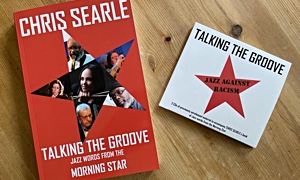Home » Jazz Articles » Book Review » Richard Cook's Jazz Encyclopedia
Richard Cook's Jazz Encyclopedia
 Richard Cook
Richard CookRichard Cook's Jazz Encyclopedia
Penguin
ISBN-10: 0141026464
ISBN-13: 978-0141026466
2007
Why, you may be asking, do we need another jazz encyclopedia? Leonard Feather's original 1955 tome, published in eleven editions between then and 1984, is still kicking around, and besides, Ira Gitler updated it in 1999. When it comes to sheer factual material, no one can beat the three-volume New Grove Dictionary Of Jazz, most recently published in 2003. And if you are interested in jazz recordings, the fourth edition of the All Music Guide To Jazz was published in 2002, while the eighth edition of the Penguin Guide To Jazz On CD came out in 2006. (The Penguin, by the way, was edited by this same Richard M. Cook, in collaboration with Brian Morton).
Well, my answers to that question would be various: the new book is more up-to-date than any of the above except the Penguin Guide To Jazz On CD, whose focus is somewhat different; it can be acquired for less than $20, while the New Grove Dictionary lists for $275; and Cook brings to the endeavor a lifetime of interest in and knowledge of jazz, a keen ability to separate "the wheat from the chaff, a dry sense of humor (see final paragraph below), and unstinting honesty.
Above all, Cook recognizes that his first responsibility is to the jazz audience—those people who buy jazz CDs and concert tickets—rather than to jazz musicians, with whom he refuses to indulge in sycophantic relationships. In his entry on drummer Butch Miles, for instance, Cook writes, "Miles acquired an unfortunate reputation as a crashingly insensitive drummer while with the Count Basie bands...some of his solo features rank with the most tedious instances of big-band drumming in history...[he] rejoined the Basie ghost orchestra in 1997, not quite a reformed character, but not so bad.
As a bonus, in addition to being bright, comprehensive (it includes more than 2,000 entries on jazz, its terminology, artists, and bands), and wonderfully accessible, the volume contains sixty pages of photos, referenced and annotated.
Cook acknowledges in his introduction that, to the newcomer, jazz can be "complicated, obscure and often plain bewildering." He himself grew up with few signposts and landmarks to guide him on his journey. This encyclopedia is an obvious attempt to impart to readers some of the features of the map he has discovered. But he makes it just as clear that the purpose of most folks' venture into jazz is to be entertained. Whether one is seeking timeless art, or simply wanting to share in the joy of a musician having fun, however, jazz can deliver. In fact, he suggests that no other genre of music is as apt to provide both of those enjoyments within the same piece of music.
Another attribute of jazz to which Cook calls attention is the fact that, over time, its various stylistic schools have all remained current. The music can be understood as having developed chronologically, but the fact is, at any given time in any given city, one is apt to find traditional, swing, bebop, fusion and avant-garde jazz being performed somewhere, all coexisting and appreciated at the same time. These factions may have warred against each other in the past, but today, jazz enthusiasts have to a degree mellowed. When they think about "us and "them now, the "us is more apt to be inclusive within the jazz community. If this feeling is a bit elitist, well, so be it—with some justification, jazz fans mutter about the marginalization of jazz by "them, an increasingly musically illiterate and artistically unsophisticated culture.
Jazz makes no pretenses of being simple, easy to understand, or undemanding. But with a guide as knowledgeable, conversational, humorous, and honest as Richard Cook, it need no longer be confusing, impenetrable, or unintelligible.
File Under Dry Humor: In his citation regarding Glenn Miller, Cook writes, "Rumours have sometimes circulated that, rather than being killed in a plane crash, he was found dead in a French brothel and the whole matter was hushed up; but this may belong in the 'Elvis Sighted on Moon' file.
< Previous
On the Other Side
Next >
Interpretations
Comments
Tags
For the Love of Jazz
 All About Jazz has been a pillar of jazz since 1995, championing it as an art form and, more importantly, supporting the musicians who create it. Our enduring commitment has made "AAJ" one of the most culturally important websites of its kind, read by hundreds of thousands of fans, musicians and industry figures every month.
All About Jazz has been a pillar of jazz since 1995, championing it as an art form and, more importantly, supporting the musicians who create it. Our enduring commitment has made "AAJ" one of the most culturally important websites of its kind, read by hundreds of thousands of fans, musicians and industry figures every month.






















